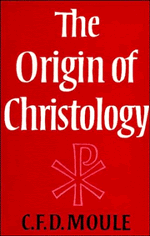Book contents
- Frontmatter
- Contents
- Acknowledgements
- Abbreviations
- Introduction
- 1 Four well-known descriptions of Jesus
- 2 The corporate Christ
- 3 Conceptions of Christ in writers other than Paul
- 4 The scope of the death of Christ
- 5 The fulfilment theme in the New Testament
- 6 Retrospect
- 7 Prospect: the ‘ultimacy’ of Christ
- Excursus: Obeisance (proskunein)
- Index of references
- Index of names
2 - The corporate Christ
Published online by Cambridge University Press: 01 June 2011
- Frontmatter
- Contents
- Acknowledgements
- Abbreviations
- Introduction
- 1 Four well-known descriptions of Jesus
- 2 The corporate Christ
- 3 Conceptions of Christ in writers other than Paul
- 4 The scope of the death of Christ
- 5 The fulfilment theme in the New Testament
- 6 Retrospect
- 7 Prospect: the ‘ultimacy’ of Christ
- Excursus: Obeisance (proskunein)
- Index of references
- Index of names
Summary
INTRODUCTORY
After stating the thesis that development more satisfactorily describes the genesis of New Testament Christology than evolution, I proceeded to test it by re-investigating the origins of four terms applied to Jesus–‘the Son of Man’, ‘the Son of God’, ‘Christ’, and ‘Lord’. The conclusion reached was that, so far from their evolving away from what was there at the beginning, there was, in each case, evidence to suggest that the term was dictated by what Jesus himself was (due care being taken to use that question-begging phrase carefully), and not by extraneous factors entering the stream of tradition from elsewhere. So conservative a conclusion is, in the nature of the case, suspect, because it is liable to be biassed by vested interests. I have myself viewed it with suspicion; but, in spite of this, I find myself convinced by the evidence. It is for readers to see whether they agree.
But, in any case, there are other phenomena in the New Testament which are of Christological importance besides the use of such terms as have just been examined; and it is to one of these that the remainder of this study is chiefly directed. This phenomenon is what, for lack of a better term, I call an understanding and experience of Christ as corporate. In some measure, this bypasses the use of titles in Christology and affords an independent criterion for the nature of Jesus Christ; and it has the merit of being undeniably early and well-established, for the evidence is largely in those Pauline epistles which are widely agreed to be genuine.
- Type
- Chapter
- Information
- The Origin of Christology , pp. 47 - 96Publisher: Cambridge University PressPrint publication year: 1977
- 3
- Cited by



